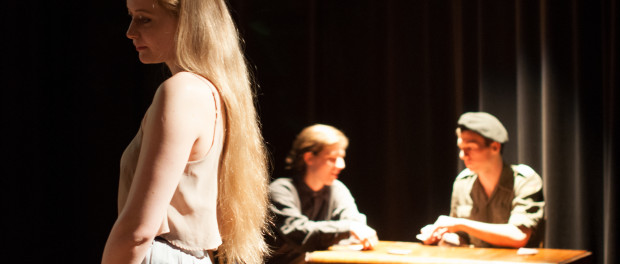Antigone Reimagined at the Tuesday Night Cafe
In the Ancient Greek play Antigone, the king’s niece threatens state security when she buries her traitorous brother against the law, calling on the law of the gods as her defense. Antigone’s defiance, her commitment to doing what she perceives as right, has been taken as a symbol against totalitarian rule. In addition to countless theatrical reworkings, the Antigone has performed in many media: from opera and ballet to youtube.
Harrison Collett directs Jean Anouilh’s reimagining of the Antigone for a Tuesday Night Café (TNC) theatrical production at McGill University. Kay Min takes the role of Antigone while Alex Bankier plays Creon. Though initially written during the 1940s in Vichy France under Nazi censorship, TNC’s production has been translated into English. Anouilh’s version is appealing because of its ambiguity.
“In the original Antigone, it’s easy to say that the king is wrong or the state is wrong,” Collett explains. “In Anouilh’s production there isn’t really a bad guy. There’s a lot more empathy for King Creon. No one wants to do what they have to do in this play.”
Many things are retained in Anouilh’s production. Like the original, there’s recently been a civil war and Antigone’s two brothers are on opposite sides and they end up killing each other. “Antigone’s uncle Creon has decided to give one brother an elaborate funeral and the traitor none at all. Antigone gives her brother burial against the king’s orders, even though the punishment is death,” says Collett. However, the change seems to begin around a particular conversation that takes place between Antigone and Creon. “Creon tries to save her and stop her from doing it,” says Collett.
It is easy to empathize with this Creon. “You don’t need to force empathy in any way,” says Collett. “Creon has lines that essentially say ‘I don’t want you to do this, you can save yourself.’ Creon actively tries to save her and she refuses to let him.”
Does that mean Antigone is a hard-headed fanatic? “A surface reading makes Antigone seem stubborn and wrong, but if you delve more into it, she has a lot of moments where she talks about her love of life and what that leaves you with is a realization is that she loves her brother and her family more than she cares to live.,” says Collett. “It’s hard to tell who the protagonist is in the play. People have argued for both sides. They both have compelling points and they both have flaws.”
The play’s ambiguity is perhaps best understood from an anecdote about its first performance. “When the show was first put on in France under Nazi occupation, both the French and German audience gave it a standing ovation,” says Collett. “Both sides thought it was arguing that their side was right.”
Messages about an overbearing state seem especially prescient in Quebec. But Collett sees the play more as a study between private desires and social responsibilities. “The play talks a lot about the duties people have and the roles they must fulfill in society that clash with what they really want to do. It’s about the clash of private and public realms and the troubles that come out of that disjoin. We face this today. We are in a democracy, but it is hard to maintain a space between the two realms.”
Antigone is Morrice Hall (3485 McTaivsh) from February 12-15, 19-22 at 8 p.m.. $10/6.







